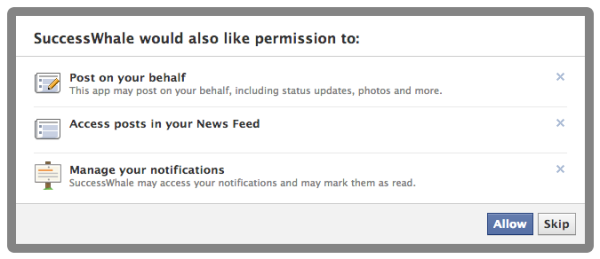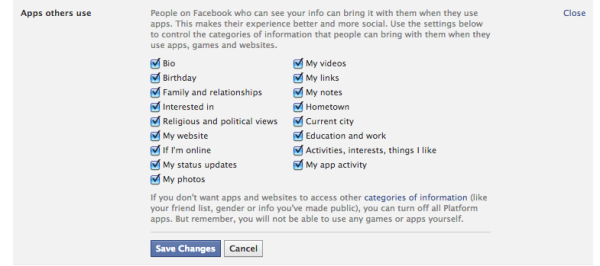This morning I tweeted my annoyance with Facebook’s privacy model, and since that provoked some (albeit minor) reaction, I thought I’d follow it up with a better explanation of what I’m on about.
Have you ever used a third-party app to access Facebook – such as TweetDeck, FriendCaster or my very own SuccessWhale? If you have, did you notice that some of your friends’ posts and notifications just don’t appear in the app, whereas on the Facebook website they are perfectly visible? Have you seen some odd comment threads where certain friends’ comments are missing when you view the thread from an app?
If you have, the problem isn’t with your app. It’s a problem with the settings that the users you can’t see have set – and that problem is that they have their privacy settings set correctly.
This is a pain in the arse for me and many others who access Facebook primarily through third-party apps, because not only do we miss out on important updates from these people, but the only way to ‘fix’ the situation is to ask them to degrade their privacy settings. As a big fan of online privacy, that’s not something I’m willing to do.
So how does this problem come about?
Well, let’s say we have two characters who want to communicate on Facebook. I’d suggest Alice and Bob, but after 20 years learning about cryptography, neither of them are willing to trust their paranoid conspiracy theories to Facebook’s messaging system. No, I started this post with an oddly-placed reference, and I’m going to persevere with it.
We have two characters, Ahab and Ishmael, who are friends aboard the good ship Facebook. Ahab fires up his favourite whale-themed client, SuccessWhale, and links it to his Facebook account. He gets a dialog like this:
Ahab clicks “Allow”, and as he granted the “Access posts in your News Feed” permission, he starts seeing posts from his friends. But not Ishmael.
Why not? Because Ishmael is a privacy-conscious sailor, and has previously found the “Apps” section of Facebook’s “Privacy Settings” dashboard. That section not only contains settings for what personal data apps you use can see, but also settings for the apps that your friends use. By default, it looks like this:
Ishmael saw that section and, quite rightly, thought “So if a friend of mine uses Farmville, this means Zynga can see everything I do on Facebook without asking my permission? Fuck that!”, and promptly unticked all the boxes. His data is now safe from unscrupulous apps used by his friends – but his data is also hidden from ‘nice’ apps too, like SuccessWhale and TweetDeck.
Arguably, this privacy model is also “right” – Facebook can’t control what apps do with the data they can see, so it has no way to distinguish between SuccessWhale (which needs to see friends’ posts in order to be useful) from FarmVille (which has no business looking at friends’ posts at all).
Not only are two sets of privacy settings making apps like mine annoying to use, but the annoyance is doubled by the fact that both of those privacy settings are arguably the right decision on the part of both our Ishmael and Facebook.
Fig. 3. A Successful Whale (artist unknown)



Comments
[…] permissions policy, as I have ranted about before, also makes it difficult for third-party clients to deliver a useful service for their users. With […]